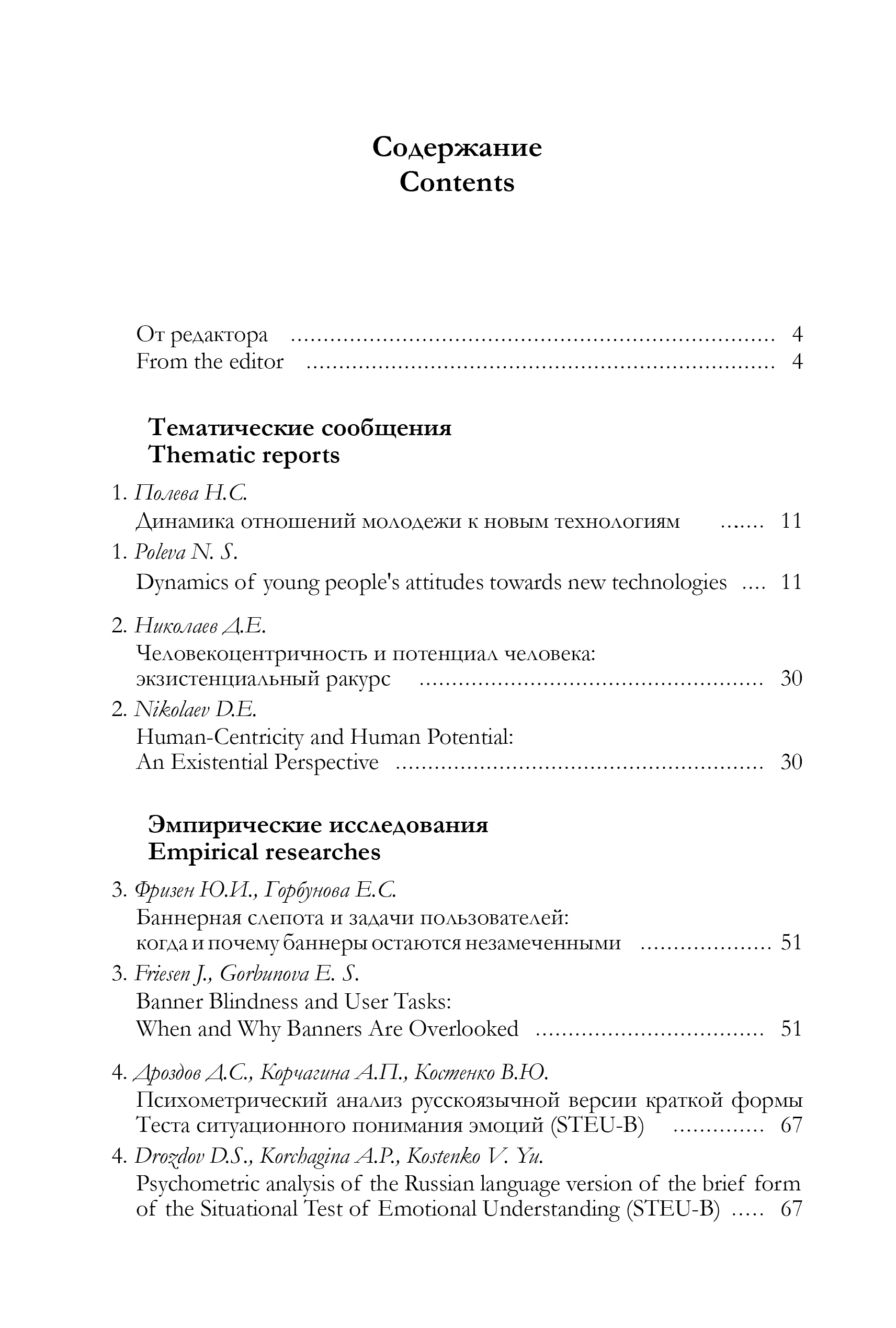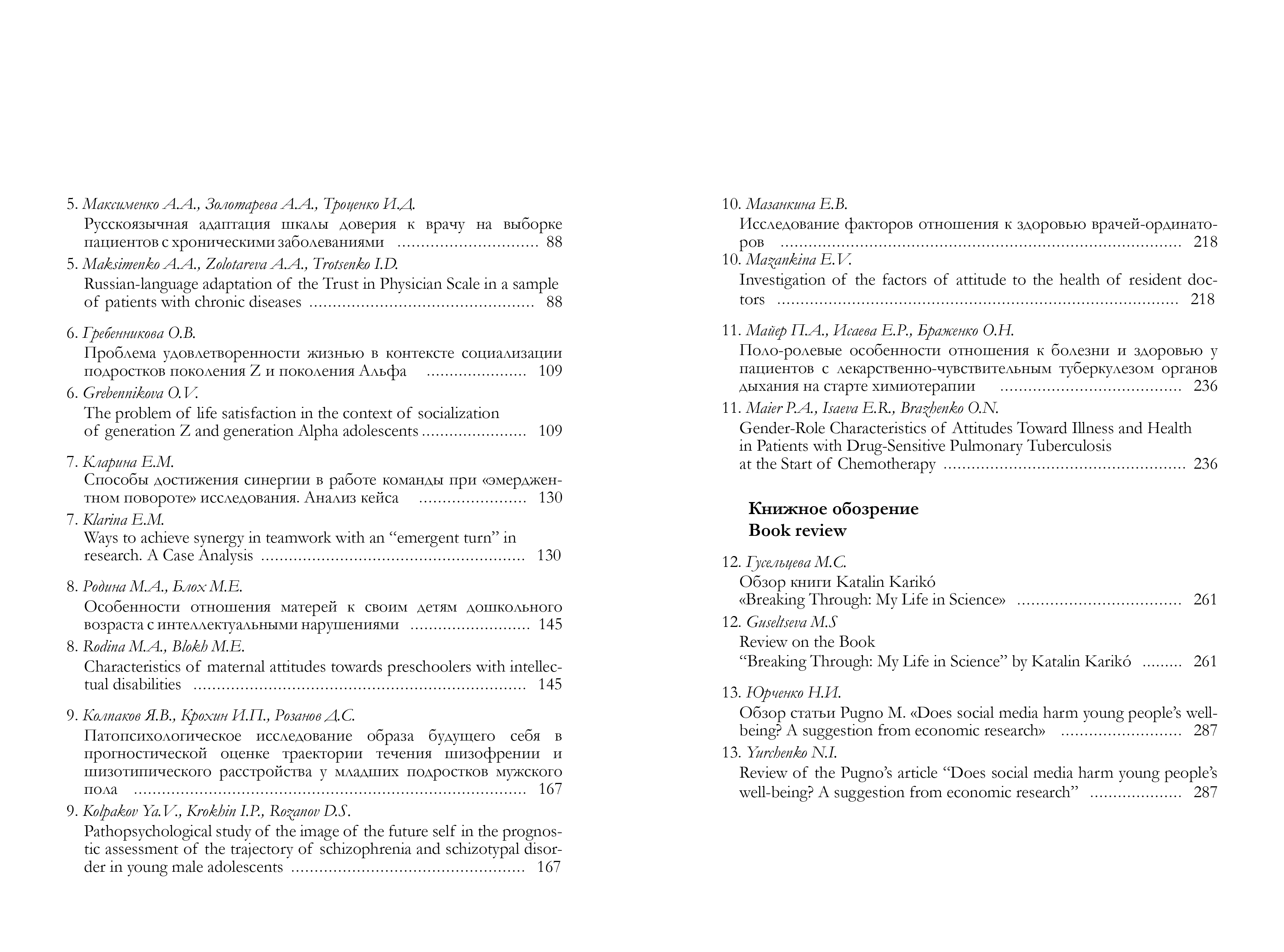From the Editor
Editor-in-chief of the journal «New psychological research» T. D. Martsinkovskaya, Moscow, 30 June 2025
Dear colleagues, I’m glad to present the second issue of our journal.
It opens with an article by N.S. Poleva, dedicated to the current problem of young people's attitudes to new technologies. The new technological revolution is significantly different in that it includes digital reality, including social networks, robotics, and artificial intelligence. The theoretical and empirical study revealed several factors that determine attitudes to new technological systems – personal, social, cultural, which must be taken into account in the context of digitalization of education.
In the article by D.E. Nikolaev “Human-centricity and human potential: an existential perspective” it is shown that a culture that supports the individual process of existential development can be considered human-centric. The key concept here is human potential, while human-centricity and human potential cannot be quantified. In a human-centric culture, private potentials get the opportunity to be realized not as a random set of resources, abilities, and skills, but as a holistic manifestation of a person.
In the article by Yu. I. Frizen and E.S. Gorbunova “Banner blindness and user tasks: when and why banners go unnoticed” explored the problem of banner perception, which is important for the psychology of marketing and advertising. The results showed that the type of task primarily determines the perception or ignoring of a banner. Tasks with a clearly defined goal suggest a narrowing of the focus of attention, while when performing a low-goal task, users are more likely to notice side elements of the page, such as banners.
The following two articles are devoted to the problem of developing and adapting new tools, which is extremely important for modern research.
The article by D.S. Drozdov, A.P. Korchagina and V.Yu. Kostenko “Psychometric analysis of the Russian-Language version of the short form of the situational understanding of emotions test (STEU-B)” presents an adaptation of the short version of the Situational Understanding of Emotions Test into Russian. It allows assessing an individual's competencies in the context of the ability to understand emotions and how an emotional situation can unfold over time. The results indicate that the STEU-B test can be used in studies where there is a need to reduce testing time, or where emotional intelligence is not a central construct.
In the work of A.A. Maksimenko, A.A. Zolotareva and I.D. Trotsenko “Russian-language adaptation of the scale of trust in a doctor on a sample of patients with chronic diseases” is presented an adaptation of the scale of trust in doctors, which is important in the digital world. The study was conducted online in the community “Cancer is curable” on the social network “VKontakte”. The results emphasized the importance of trust as a factor contributing to compliance with medical recommendations, reducing the level of cyberchondria and increasing the effectiveness of patient-doctor interaction.
In the article by O.V. Grebennikova “The problem of life satisfaction in the context of socialization of adolescents of generation Z and generation Alpha” it is shown that life satisfaction, satisfaction with school life and communicative control are higher in adolescents of generation Z than in adolescents of generation Alpha. At the same time, the higher the life satisfaction scale of Generation Z teenagers, the higher their satisfaction with school life, communicative control and the need to expand friendly contacts. And for Generation Alpha teenagers, life satisfaction positively correlates only with satisfaction with school life.
E.M. Klarina in the article “Ways to achieve synergy in team work with the "emergent turn" of the study. Case analysis” showed the positive aspects and difficulties that arise when respondents are involved in qualitative research. In the given example, additional data led to a change in the research topic, the formulation of a new research question and the emergence of a second series. The consequence of the emergent turn of the study was not only the second series of interviews with questions to participants about understanding pantomime in the new context that opened up, but also changes in the work of the experts who analyzed the interviews, as well as the reflection of this work, presented in the article.
In the work of M.A. Rodina and M.E. Blokh “Characteristics of mothers' attitudes towards their preschool-age children with intellectual disabilities” key predictors influencing the level of maternal acceptance of the child were identified. High internal resourcefulness and social activity of the mother have a positive effect on her acceptance of the child. On the contrary, an increased level of depression reduces the degree of acceptance. The obtained results emphasize the complex influence of personal, emotional and social factors on both the mother's and the child's part on the formation of parent-child relationships.
In the article by Ya.V. Kolpakov, I.P. Krokhin and D.S. Rozanov “Pathopsychological study of the image of the personal future in the prognostic assessment of the trajectory of schizophrenia and schizotypal disorder in younger male adolescents” a study was conducted on the trajectory of schizophrenia and schizotypal disorder in younger adolescents. The results of the pathopsychological study show that the nosospecificity of the schizophrenic symptom complex reflects its stability in the cultural and historical considering.
In the article by E. V. Mazankina “Study of the factors of attitude to health of medical residents” the doctor’s attitude to their own health and psychological factors that promote or hinder the formation of an adaptive attitude and behavioral strategies in relation to their health were studied. Several factors were identified that help or hinder an adequate attitude to the personal health. The necessity of the the development of support programs aimed at improving the physical and mental well-being of doctors was shown.
In the article by P. A. Mayer, E. R. Isaeva and O. N. Brazhenko “Gender-role features of attitude to disease and health in patients with drug-sensitive tuberculosis of the respiratory organs at the start of chemotherapy” the gender differences in value orientations, attitude to disease and health were revealed. These results must be taken into account when forming an individualized program of psychological support for patients at the start of chemotherapy. Also, regardless of gender, it is necessary to include trainings on the formation of the value of health and a healthy lifestyle.
In the article by M.S. Guseltseva, a review of the book by Katalin Karikó “Breaking through: my life in science” is given. In her book, Katalin Karikó, a Nobel Prize laureate in physiology and medicine shows that it is necessary to clearly distinguish between markers of prestige (academic titles, ratings, number of citations, statuses, etc.) and markers of quality science. She calls on scientists to follow their inner conviction, not to abandon efforts to reveal their potential and continue working despite obstacles and failures.
N.I. Yurchenko in her review of the article by Pugno M. “Does social media harm young people's well-being? A suggestion from economic research” reveals the author's analysis of the use of social networks by young people. Based on data from the US, UK, Germany, Italy and Spain, the author concludes that overall social media use has a negative impact on the well-being and mental health of young people, as it displaces useful activities aimed at achieving long-term and socially useful goals.
I wish everyone a great summer and a wonderful holiday!


Received: 30th june 2025
Published: 30th june 2025